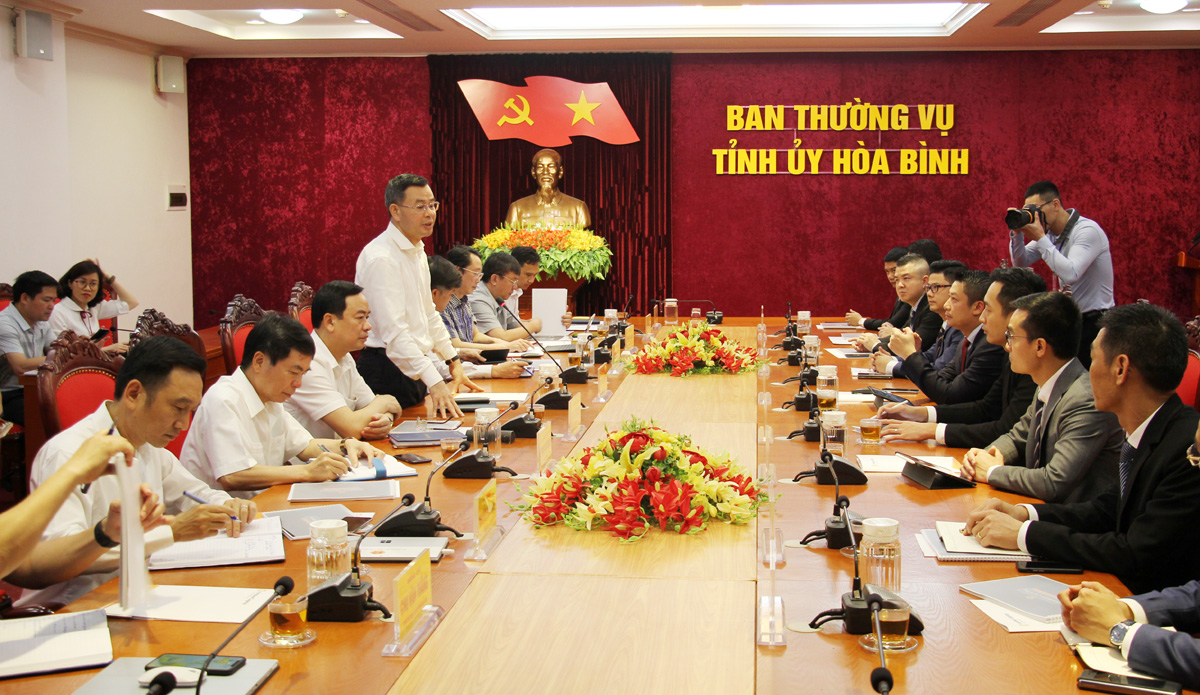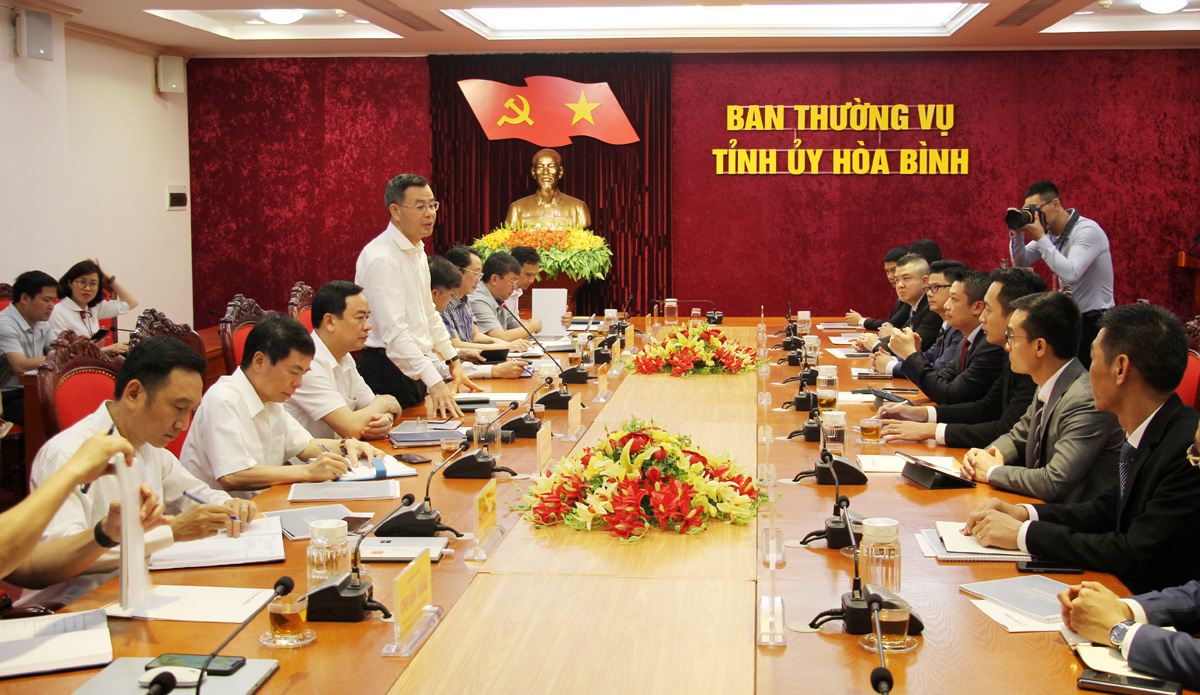
(HBO) - Ngo Van Tuan, member of the Party Centre Committee and Secretary of the Hoa Binh provincial Party Committee, had a meeting on April 8 with a delegation from Amber Group to discuss the firm’s ideas on investment in the province. Also attending the function were Quach Tat Liem, Vice Chairman of the provincial People’s Committee; leaders of the provincial Departments of Planning an Investment, Construction, Natural Resources and Environment, Industry and Trade; the provincial management board of industrial parks and the provincial centre for trade and tourism promotion.
 Ngo Van Tuan, member of the Party Central Committee and Secretary of
the Hoa Binh Party Committee, speaks at the event.
Ngo Van Tuan, member of the Party Central Committee and Secretary of
the Hoa Binh Party Committee, speaks at the event.
Chairman of the Amber group’s Board of Directors Le Manh
Linh said the group wants to invest in eco-tourism and resort property, golf
course, industrial real estate and culture in Hoa Binh. Amber is committed to ensure all financial and capacity
factors for successful implementation of its projects, he stated.
Tuan informed the group on Hoa Binh’s potential, advantages,
development orientations, and recent socio-economic progresses. He said the province is focusing on business climate
improvement, infrastructure investment, and human resources development toward
green and sustainable growth.
The official highlighted the local efforts in administrative
reform and support for investors regarding removing land clearance obstacles
and project implementation. Hoa Binh aims to turn tourism into a spearhead industry,
develop industry as the foundation for the provincial economy while hoping to
become the "kitchen” of the capital region, he said.
He emphasized the province’s orientation of green development
and pledged the provincial authorities’ maximum assistance for capable
investors to carry out projects in the locality along this orientation.
At the meeting, participants agreed that investment should
concentrate in tapping Hoa Binh lake’s potential and in developing transport
infrastructure and high-quality industry in association with modern urban
areas./.
In the spirit of "Party members go first, the people follow”, all households of Party members in the Doan Ket sub-region in Da Bac town, Da Bac district, voluntarily removed gates and fences, and donated land when the road expansion project passed through their properties. Inspired by their example, 68 households in the sub-region quickly followed suit, contributing over 1,400 sq.m of residential and perennial cropland to widen the main road through the residential area. The exemplary role of Party members in Doan Ket stands as a shining example of studying and following President Ho Chi Minh’s thought, morality, and lifestyle.
The Hoa Binh provincial People's Committee held a monthly meeting on May 29 to assess the implementation of socio-economic development tasks in the first six months of 2025, the progress of key projects, and some other important issues.
During his lifetime, President Ho Chi Minh always expressed his deep affection and special concern for children and youth. He once emphasized: "Caring for and educating children well is the responsibility of the entire Party and the entire people”; "First of all, the family (i.e. grandparents, parents, siblings) must do this job well”. "the Party Committees…, the Children’s Committee, the Youth Union, the education sector, and all related organizations must have specific plans to ensure children grow healthier and more progressive”. His teachings has been remaining valuable and serving as the guiding principles in the work of protecting, caring for, and educating children. In line with this ideology, Hoa Binh Province has continuously been prioritizing and investing resources in the well-being of children in recent years.
Mr. Nguyen Phi Long, the alternate Member of the Party Central Committee and Secretary of the Provincial Party Committee chaired the meeting of the Standing Committee of the Provincial Party Committee to provide opinions on several investment projects within the province. There was the attendance of Ms. Bui Thi Minh, the Permanent Deputy Secretary of the Provincial Party Committee and Chairwoman of the Provincial People’s Council; Mr. Bui Đuc Hinh, the Deputy Secretary of the Provincial Party Committee and Chairman of the Provincial People’s Committee and other members of the Standing Committee; the leaders from other departments, agencies, and some localities.
The Standing Board of the Vietnam Fatherland Front (VFF) Committee of Hoa Binh province held a meeting on May 28 to honour outstanding village elders, village heads, and reputable individuals from local ethnic minority and religious communities.
In mid-May, the provincial Museum organised an exhibition named "Duoi la co Dang Cong san Viet Nam quang vinh” (Under the flag of the glorious Communist Party of Vietnam). This meaningful activity took place in the joyful atmosphere to celebrate the country's major holidays and the Party congresses at all levels for the 2025-2030 term, towards the 14th National Party Congress.



 Ngo Van Tuan, member of the Party Central Committee and Secretary of
the Hoa Binh Party Committee, speaks at the event.
Ngo Van Tuan, member of the Party Central Committee and Secretary of
the Hoa Binh Party Committee, speaks at the event.